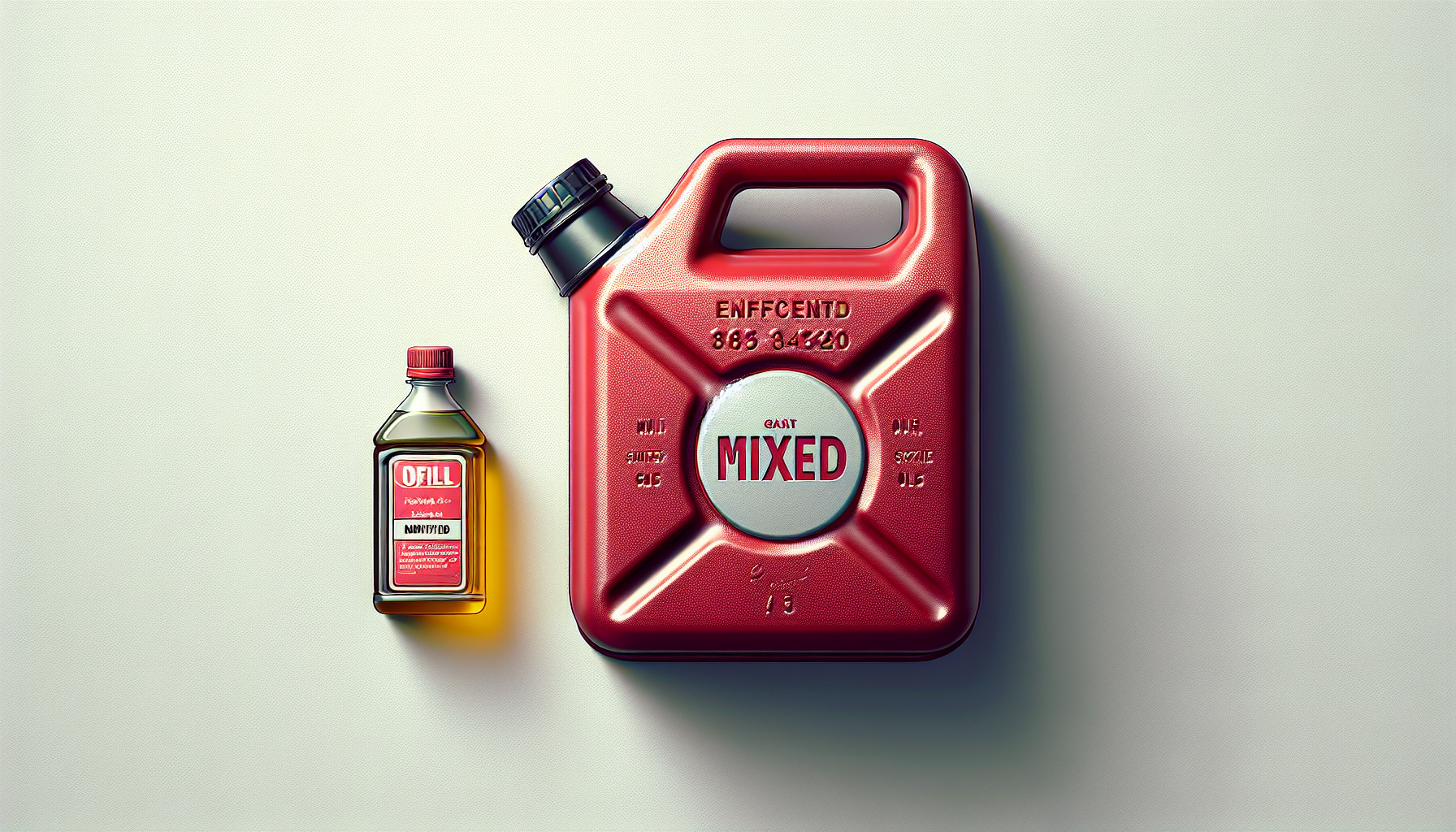If you’ve recently purchased a snowblower or are considering getting one, you may be wondering, “Does my snowblower need mixed gas?” It’s a common question among snowblower owners, and understanding the answer is crucial for proper maintenance and performance. In this article, we’ll explore whether or not your snowblower requires mixed gas, providing you with the information you need to keep your equipment running smoothly and efficiently. So, let’s clear away the confusion and get your snowblower ready for the winter season!
Understanding Snowblower Engines
When it comes to snowblowers, it’s essential to understand how their engines work and what type of fuel they require. Snowblower engines come in two main types: two-stroke engines and four-stroke engines. Each type has its own advantages and disadvantages, including different fuel requirements.
Types of Snowblower Engines
Two-stroke engines are commonly found in older snowblower models. These engines require a mixture of gasoline and oil to operate effectively. The gasoline provides the necessary fuel, while the oil lubricates the moving parts of the engine. On the other hand, four-stroke engines, which are more commonly found in modern snowblower models, operate on gasoline alone.
Two-Stroke Engines vs. Four-Stroke Engines
Two-stroke engines have a simpler design and are generally lighter, making them more portable and maneuverable. However, they tend to be louder, produce more emissions, and require more frequent maintenance compared to their four-stroke counterparts. Four-stroke engines, while heavier, are quieter, more fuel-efficient, and require less maintenance. Understanding the type of engine your snowblower has is crucial in determining its fuel requirements.
Fuel Requirements for Snowblower Engines
The fuel requirements for snowblower engines depend on the type of engine you have. If you own a two-stroke engine, you will need to use mixed gas, which is a blend of gasoline and oil. However, if you own a four-stroke engine, you can use regular gasoline without the need for mixing. It’s important to understand the specific fuel requirements of your snowblower to ensure its optimal performance and longevity.
What is Mixed Gas?
Mixed gas, also known as a fuel mixture or fuel/oil mixture, is a combination of gasoline and oil in specific proportions. It is used exclusively for two-stroke engines, including those found in some snowblowers. The oil in the mixed gas serves as a lubricant for the engine’s moving parts, ensuring smoother operation and reducing friction and wear.
The ratio of gasoline to oil in the mixed gas can vary depending on the manufacturer’s specifications, but common ratios include 50:1 and 40:1, meaning 50 or 40 parts gasoline to 1 part oil, respectively. It’s crucial to mix the gas and oil accurately to achieve the right ratio, as using an improperly mixed fuel can lead to engine damage.
Advantages and Disadvantages
Using mixed gas in your snowblower can have both advantages and disadvantages. Understanding these can help you make an informed decision on whether or not to use mixed gas for your specific snowblower.
Advantages of Using Mixed Gas
-
Engine Lubrication: The oil in mixed gas ensures proper lubrication of the engine’s moving parts, which reduces friction and wear. This can extend the lifespan of your snowblower and improve its overall performance.
-
Smoother Operation: Mixed gas can promote smoother engine operation, leading to less noise and vibration. This can make your snowblower more pleasant to use and enhance your overall snow-clearing experience.
Disadvantages of Using Mixed Gas
-
Fuel Mixing: Unlike four-stroke engines that use regular gasoline, using mixed gas requires you to accurately mix gasoline and oil in the correct ratio. This process can be time-consuming and slightly more complicated, especially for those unfamiliar with two-stroke engines.
-
Emissions and Smell: Two-stroke engines tend to produce more emissions and emit a distinct odor due to the oil present in the fuel mixture. Using mixed gas can contribute to environmental pollution and may not be suitable for those who are sensitive to strong smells.
Determining the Fuel Requirements of Your Snowblower
To determine the fuel requirements of your snowblower, there are several steps you can take. It’s important to refer to the snowblower’s user manual, consult the manufacturer, and consider their recommendations.
Checking the User Manual
The user manual is an invaluable resource for understanding your snowblower’s fuel requirements. It will clearly specify whether your snowblower has a two-stroke or four-stroke engine and provide instructions on the type of fuel to use. It may also provide guidance on the proper fuel mixing ratios if your snowblower requires mixed gas.
Consulting the Manufacturer
If you’re unsure about the fuel requirements, it’s always best to consult the manufacturer directly. They will have the most accurate information regarding their specific snowblower models and can provide guidance on the type of fuel to use. Manufacturers often have customer service helplines or online support forums where you can seek assistance.
Considering the Manufacturer’s Recommendations
Manufacturers may also recommend specific brands or types of fuel to use in their snowblowers. These recommendations are often based on extensive testing and research to ensure optimal performance, reliability, and longevity of their products. Considering these recommendations can help you make the right choice when selecting a fuel for your snowblower.
Pros and Cons of Using Mixed Gas
Understanding the pros and cons of using mixed gas can further assist you in deciding whether it’s the right choice for your snowblower.
Pros of Using Mixed Gas
-
Engine Lubrication: As mentioned earlier, using mixed gas ensures proper lubrication of the engine’s moving parts, reducing wear and increasing the lifespan of your snowblower.
-
Enhanced Performance: Mixed gas can promote smoother operation, which can result in improved snowblower performance. This can result in better snow clearing and a more efficient operation overall.
Cons of Using Mixed Gas
-
Time and Effort: Mixing gasoline and oil in the correct ratio can be a time-consuming process. If you’re not comfortable with the mixing process or prefer a more straightforward fuel option, this can be a disadvantage.
-
Environmental Impact: Two-stroke engines using mixed gas tend to produce more emissions and contribute greater pollution. If environmental concerns are important to you, choosing an alternative fuel option may be more suitable.
Alternatives to Mixed Gas
If you prefer not to use mixed gas in your snowblower, there are alternative fuel options available that may better suit your needs.
Using Regular Gasoline
If your snowblower has a four-stroke engine, it is designed to run on regular gasoline without requiring any fuel mixing. This can be a convenient and straightforward option, as you can directly fill the fuel tank with regular gasoline and avoid the additional step of mixing oil.
Using Ethanol-Free Gasoline
Ethanol-free gasoline, also known as pure gasoline or premium gasoline, is another alternative for snowblowers. Ethanol can attract moisture, leading to potential fuel system issues, particularly during the winter when condensation is more likely. Opting for ethanol-free gasoline can help mitigate this problem and improve the overall performance and longevity of your snowblower.
Using Fuel Additives
Fuel additives are products designed to enhance the properties of gasoline. They can provide additional lubrication, improve fuel stability, and reduce harmful emissions, among other benefits. Using fuel additives can be a viable option for those who want to optimize their snowblower’s performance while using either mixed gas or regular gasoline.
Preparing the Snowblower for Winter
Before winter arrives, it’s essential to prepare your snowblower for the cold months ahead. Proper winter preparation can help ensure your snowblower starts easily, runs smoothly, and remains reliable throughout the snowy season.
Draining the Fuel Tank
If you live in an area with mild winters or don’t anticipate using your snowblower for an extended period, consider draining the fuel tank. Storing a snowblower with a full fuel tank over the summer months can lead to fuel degradation and potential engine problems. Draining the fuel tank helps prevent these issues and ensures your snowblower is ready for use when winter arrives.
Using Fuel Stabilizers
Fuel stabilizers are additives designed to prevent fuel degradation and maintain its quality over extended periods. Adding a fuel stabilizer to the fuel tank before storing your snowblower can help keep the gasoline fresh and prevent potential starting and performance issues when the time comes to use it again.
Proper Storage Techniques
When storing your snowblower, it’s essential to follow proper storage techniques. This includes cleaning the snowblower, ensuring all moving parts are well-lubricated, and storing it in a dry and protected area, such as a garage or shed. Proper storage can help prevent rust, damage, and deterioration, ensuring your snowblower is in excellent condition when you need it.
Common Mistakes to Avoid
To keep your snowblower running smoothly and avoid unnecessary problems, it’s important to avoid some common mistakes often made by snowblower owners.
Using the Wrong Fuel Mixture
Using the wrong fuel mixture, particularly in two-stroke engines, can lead to severe engine damage and decreased performance. Always consult the user manual, manufacturer’s recommendations, or seek professional advice to ensure the correct fuel mixture for your snowblower.
Neglecting Regular Maintenance
Snowblowers, like any other mechanical equipment, require regular maintenance to operate at their best. Neglecting routine maintenance tasks such as oil changes, spark plug replacements, and air filter cleanings can lead to decreased performance, increased fuel consumption, and potential breakdowns.
Ignoring the User Manual Instructions
The user manual provided by the manufacturer contains crucial instructions and guidelines for operating and maintaining your snowblower. Ignoring or neglecting these instructions can result in incorrect fuel usage, improper maintenance, and potential safety hazards. Always refer to the user manual and follow the instructions provided to ensure the optimal operation of your snowblower.
Conclusion
Determining whether your snowblower needs mixed gas depends on the type of engine it has. Two-stroke engines require mixed gas, while four-stroke engines can use regular gasoline. Understanding the advantages and disadvantages of using mixed gas, as well as considering alternative fuel options, can help you make an informed decision that suits your specific needs and preferences. Remember to consult the user manual, follow manufacturer recommendations, and take proper care of your snowblower to ensure optimal performance, longevity, and hassle-free snow-clearing.


